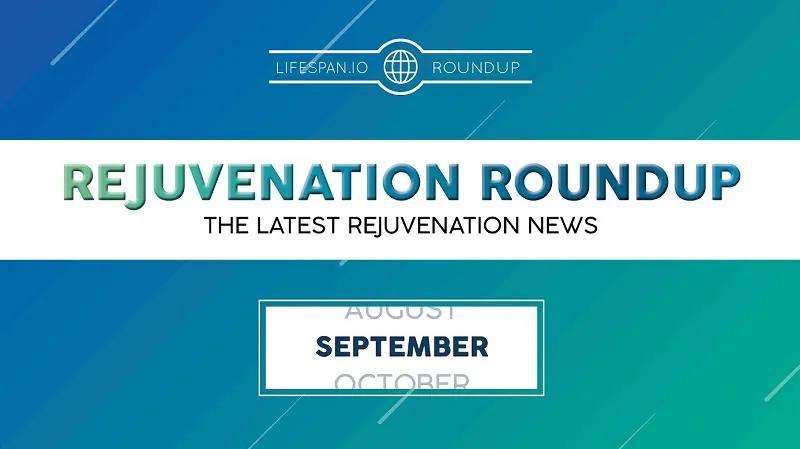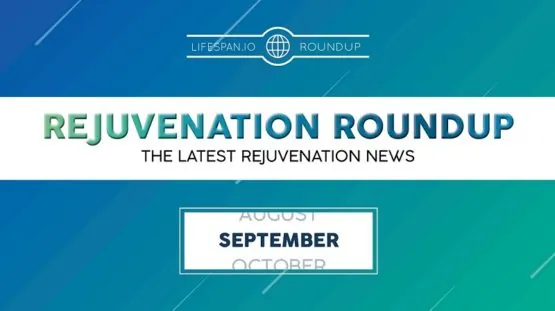One second, one life: this axiom was true when LEAF was founded, and it remains true today. More than one person a second dies from age-related diseases, not including contagious diseases that youthful immune health would likely have protected them from. Let’s see what progress has been made last month in helping people live longer.
LEAF News
In support of international longevity day October 1st, Novos is offering a discount on purchases. Enter NOVOS10 at checkout for 10% off all NOVOS products. Redeem on or by October 31. EARD2021
EARD2021
 Terry Grossman on His Longevity Clinic: Elena Milova and Terry Grossman discuss his longevity clinic and how current medicine deals with the problems of aging.
Terry Grossman on His Longevity Clinic: Elena Milova and Terry Grossman discuss his longevity clinic and how current medicine deals with the problems of aging.
Steve Horvath on Pan-Mammalian Epigenetic Clocks: Steve Horvath discussed a cytosine-based, pan-mammalian epigenetic clock that works across a wide variety of species. He also discussed how several of the hallmarks of aging do not seem to have any effect on epigenetic alterations.
 Aubrey de Grey on Rejuvenation Policy: Dr. Aubrey de Grey discussed the transition of rejuvenation biotechnology from proof-of-concept to companies engaging in clinical trials, and he outlined the challenges inherent in such a move.
Aubrey de Grey on Rejuvenation Policy: Dr. Aubrey de Grey discussed the transition of rejuvenation biotechnology from proof-of-concept to companies engaging in clinical trials, and he outlined the challenges inherent in such a move.
Alexandra Stolzing on SENS Projects: Prof. Alexandra Stolzing of SENS Research Foundation discussed what SENS is doing in terms of grants, company creation and intervention development, and programs for college students.
Lifespan News
 Altos Labs: This episode of Lifespan News is about Altos Labs, a new billionare-financed company that is pledged to focus on aging.
Altos Labs: This episode of Lifespan News is about Altos Labs, a new billionare-financed company that is pledged to focus on aging.
mRNA for Cancer Treatment: This episode talks about how mRNA pioneer BioNTech is using its technology to treat cancer as well as COVID-19.
Impetus Grants for Longevity: We’re happy to report on this episode that roughly $26 million will be given in grants to people working on age-related research, with cryptocurrency as the vehicle.
Aubrey de Grey on Life Extension Today: Ryan O’Shea explains Dr. Aubrey de Grey’s mission-focused talk at Ending Age-Related Diseases 2021, where he outlined the challenges facing a nascent rejuvenation biotechnology industry.
Interviews
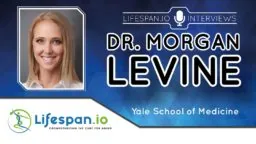 Dr. Morgan Levine on Building a Better Epigenetic Clock: In her lab at Yale, Dr. Morgan Levine tackles some of the most exciting and difficult problems in geroscience. She specializes in bioinformatics and is working on creating and finessing clocks that measure biological age. We talked with Dr. Levine about her work, the impact that biological age clocks have had on the longevity field
Dr. Morgan Levine on Building a Better Epigenetic Clock: In her lab at Yale, Dr. Morgan Levine tackles some of the most exciting and difficult problems in geroscience. She specializes in bioinformatics and is working on creating and finessing clocks that measure biological age. We talked with Dr. Levine about her work, the impact that biological age clocks have had on the longevity field
Science to Save the World
MANiAC Robots: What used to be science fiction is becoming science fact: tiny robots might be able to deliver medication to where it is needed.
 Robotic Hearts: Unlike previous models, this new, hydraulically controlled heart can vary its pumping rate to meet the body’s oxygen and energy needs.
Robotic Hearts: Unlike previous models, this new, hydraulically controlled heart can vary its pumping rate to meet the body’s oxygen and energy needs.
Cellular Reprogramming: This topic is often covered on Lifespan.io, and this STSTW episode provides an overview of this intriguing method of potentially reversing biological age.
Rejuvenation Roundup Podcast
Ryan O’Shea of Future Grind hosts this month’s podcast, showcasing the events and research discussed here.
Education
Exploring the Senescence-Associated Secretory Phenotype: Today, we want to highlight a recent review that charts the pro-inflammatory signals produced by senescent cells. The SASP contributes to the smoldering background of chronic inflammation that typically accompanies aging and can cause many problems.
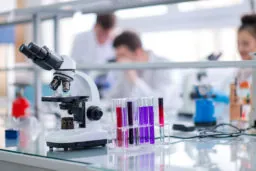 Working in Longevity with a Non-Traditional Background: The Program Director of the On Deck Longevity Biotech Fellowship gives us some examples of leaders and founders working on aging that came from “non-traditional” backgrounds.
Working in Longevity with a Non-Traditional Background: The Program Director of the On Deck Longevity Biotech Fellowship gives us some examples of leaders and founders working on aging that came from “non-traditional” backgrounds.
What is Nicotinamide Riboside?: Steve Hill explains nicotinamide riboside (NR), a part of the B3 vitamin family. Like other forms of vitamin B3, nicotinamide riboside gets converted into nicotinamide adenine dinucleotide (NAD+), a coenzyme essential for life.
Research Roundup
 5-Day Fast Improves Longevity Biomarkers in Humans: A recent study in Clinical and Translational Medicine followed people who went 5 days without eating and found improvements both immediately afterwards and up to 98 days later.
5-Day Fast Improves Longevity Biomarkers in Humans: A recent study in Clinical and Translational Medicine followed people who went 5 days without eating and found improvements both immediately afterwards and up to 98 days later.
A Metabolic Peptide Improves Cognitive Performance in Mice: Cognitive decline and neurological aging may involve a peptide known as adropin, according to new research. The identification of this link offers a new perspective on the aging brain and points to novel potential therapies.
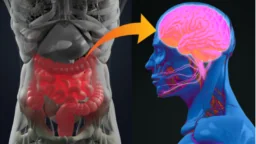 Fecal Transplantation for Alzheimer’s Disease: A recent review published in Cureus shows why fecal microbial transplantation (FMT) might be able to help sufferers of Alzheimer’s disease, showing how tightly the gut and brain are intertwined.
Fecal Transplantation for Alzheimer’s Disease: A recent review published in Cureus shows why fecal microbial transplantation (FMT) might be able to help sufferers of Alzheimer’s disease, showing how tightly the gut and brain are intertwined.
MTOR Inhibition Leads to 30% Life Extension in Progeric Mice: Researchers have created a new mouse model for studying Hutchinson-Gilford progeria syndrome (HGPS) and achieved 30% lifespan extension in these animals by genetically downregulating mTOR.
 Boosting NANOG to Revitalize Muscle Cell Progenitors: Boosting the expression of the transcription factor NANOG reduces markers of cellular senescence in cultured muscle cells and in live mouse models. This holds out the hope that cells could be rejuvenated without reprogramming them to pluripotency, avoiding some of the associated risks such as oncogenicity.
Boosting NANOG to Revitalize Muscle Cell Progenitors: Boosting the expression of the transcription factor NANOG reduces markers of cellular senescence in cultured muscle cells and in live mouse models. This holds out the hope that cells could be rejuvenated without reprogramming them to pluripotency, avoiding some of the associated risks such as oncogenicity.
Key Source of Thymic Aging Discovered: Publishing in Nature Communications’ Cell Death Discovery, a team of Chinese researchers has discovered a reason for thymic involution, the age-related decline of the thymus. When thymic epithelial cells (TECs) are dysregulated and the function of the thymus falters, this can lead to both infection susceptibility and autoimmune disorders.
 MoveAge: A New Movement-Based Biological Aging Clock: Researchers have developed a biological aging clock based on movement data from wearable devices. Using their clock and the same dataset, they identified a few possibly life-prolonging nutrients and drugs.
MoveAge: A New Movement-Based Biological Aging Clock: Researchers have developed a biological aging clock based on movement data from wearable devices. Using their clock and the same dataset, they identified a few possibly life-prolonging nutrients and drugs.
Understanding How We Evolved to Age: This review examines the appearance of the hallmarks in different groups across the tree of life, with the aim of providing a comprehensive picture of how the mechanisms of aging have evolved.
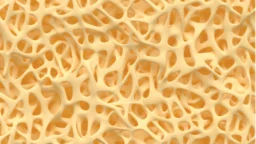 Epigenomic Rejuvenation for Restoring Bone Stem Cells: Researchers have shown that age-related loss of bone maintenance is caused by changes in gene expression. Perhaps most importantly, those changes can also be reversed and the bone marrow stem cells rejuvenated.
Epigenomic Rejuvenation for Restoring Bone Stem Cells: Researchers have shown that age-related loss of bone maintenance is caused by changes in gene expression. Perhaps most importantly, those changes can also be reversed and the bone marrow stem cells rejuvenated.
Senolytics Alleviate Spinal Disc Degeneration in Mice: A group of researchers has found that early long-term treatment of mice with the popular senolytic duo dasatinib and quercetin alleviates symptoms of intervertebral disc degeneration, a major age-related cause of disability.
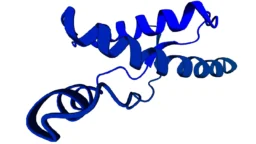 Getting Proteins Right to Live Longer: Changing a single amino acid in a single protein boosts the fidelity of protein synthesis, and new research shows how that is enough to increase lifespan in a variety of organisms.
Getting Proteins Right to Live Longer: Changing a single amino acid in a single protein boosts the fidelity of protein synthesis, and new research shows how that is enough to increase lifespan in a variety of organisms.
Our Brains’ Metabolism Changes as We Age: A study conducted in Sweden and published in Scientific Reports has outlined the relationship between aging and the metabolites present in cerebrospinal fluid (CSF), which cushions and supports the brain and spine.
 Activity and Diet Shown to Slow Aging (Again): Scientists have used DNA methylation markers to measure the anti-aging effects of healthy diet and physical activity, reaching interesting, if at times contradictory, results.
Activity and Diet Shown to Slow Aging (Again): Scientists have used DNA methylation markers to measure the anti-aging effects of healthy diet and physical activity, reaching interesting, if at times contradictory, results.
The Effects of Caloric Restriction on Stem Cells: A review published in The Malaysian Journal of Medical Sciences has outlined what effects caloric restriction (CR) has on the development and differentiation of stem cells.
 Study Suggests No Theoretical Limit on Human Lifespan: This study shows that mortality risk stops increasing past 110 years of age, so it may be possible, although unlikely, for a human to live 130 years or perhaps longer, even without a rejuvenative intervention.
Study Suggests No Theoretical Limit on Human Lifespan: This study shows that mortality risk stops increasing past 110 years of age, so it may be possible, although unlikely, for a human to live 130 years or perhaps longer, even without a rejuvenative intervention.
Calorie intake rather than food quantity consumed is the key factor for the anti-aging effect of calorie restriction: The researchers illustrate the effects of caloric restriction and food quantity on lifespan extension along with the potential mechanisms of action.
Steps per Day and All-Cause Mortality in Middle-aged Adults in the Coronary Artery Risk Development in Young Adults Study: Men and women of African and Caucasian descent benefited from taking more than 7,000 steps per day.
Association of Walnut Consumption with Total and Cause-Specific Mortality and Life Expectancy in U.S. Adults: Higher walnut consumption was associated with a lower risk of total and CVD mortality and a greater gained life expectancy among U.S. elder adults.
Nicotinamide Riboside Improves Ataxia Scores and Immunoglobulin Levels in Ataxia Telangiectasia: Treatment with NR is tolerated well and associated with improvement in ataxia and serum immunoglobulin concentrations in patients with this disease.
Effect of resveratrol on C-reactive protein: An updated meta-analysis of randomized controlled trials: This meta-analysis demonstrates that resveratrol consumption is effective in lowering the levels of this inflammation-associated protein.
The Effects of Korean Red Ginseng on Biological Aging and Antioxidant Capacity in Postmenopausal Women: KRG significantly increased the mtDNA copy number and total antioxidant status while improving symptoms of fatigue in postmenopausal women.
Lithium can mildly increase health during ageing but not lifespan in mice: Lithium has a narrow therapeutic dose range, and overdosing can severely affect organ health. Within the tolerable dosing range, the researchers found some mildly positive effects of lithium on healthspan but not on lifespan.
DNA methylation age analysis of rapamycin in common marmosets: Overall, the epigenetic clocks developed here for the common marmoset are expected to be useful for age estimation of wild-born animals and for anti-aging studies in this species.
Surrounding Greenness and Biological Aging Based on DNA Methylation: A Twin and Family Study in Australia: Higher surrounding greenness (vegetation) was associated with slower biological aging, as indicated by GrimAge age acceleration, in Australian women.
The association between epigenetic clocks and physical functioning in older women: a three-year follow-up: While GrimAge performed the best, current epigenetic clocks do not provide strong benefits in predicting the decline of physical functioning, at least during a rather short follow-up period and restricted age-range.
Reversible reprogramming of cardiomyocytes to a fetal state drives heart regeneration in mice: Short-term OSKM expression before and during myocardial infarction ameliorates myocardial damage and improves cardiac function.
Cardiac radiotherapy induces electrical conduction reprogramming in the absence of transmural fibrosis: Collectively, this study provides evidence for radiation-induced reprogramming of cardiac conduction as a potential treatment strategy for arrhythmia management in VT patients.
A genome-engineered bioartificial implant for autoregulated anticytokine drug delivery: Therapeutic implants completely prevented increased pain sensitivity and bone erosions, a feat not achievable by current clinically available disease-modifying drugs.
Gut Microbiota Predicts Healthy Late-Life Aging in Male Mice: Using machine learning techniques, the researchers show that gut microbial signatures from 21-month-old mice can predict the healthy aging of 30-month-old mice with reasonable accuracy.
Hyperbaric oxygen therapy alleviates vascular dysfunction and amyloid burden in an Alzheimer’s disease mouse model and in elderly patients: This study demonstrates the efficacy of hyperbaric oxygen therapy in hypoxia-related neurological conditions, particularly in AD and aging.
News Nuggets
 Altos Labs Launches with a Focus on Cellular Reprogramming: A new company focused on aging has launched, and it has the backing of Yuri Milner and Jeff Bezos among other wealthy people interested in tackling aging.
Altos Labs Launches with a Focus on Cellular Reprogramming: A new company focused on aging has launched, and it has the backing of Yuri Milner and Jeff Bezos among other wealthy people interested in tackling aging.
BioNTech mRNA Cancer Treatment Enters Human Trials: The current pandemic has brought mRNA vaccines into the spotlight and have likely sped up the widespread adoption and usage of this technology. Now, a company has its sights set on treating cancer with mRNA technology, and the initial animal data is positive.
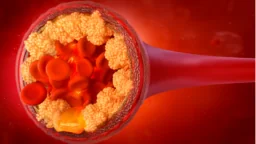 Underdog Pharmaceuticals Receives Accelerated Designation: Underdog Pharmaceuticals has just issued a press release announcing that UDP-003, a compound being studied for its effectiveness against oxidized cholesterol, has been given an Innovation Passport under the UK’s Innovative Licensing and Access Pathway program.
Underdog Pharmaceuticals Receives Accelerated Designation: Underdog Pharmaceuticals has just issued a press release announcing that UDP-003, a compound being studied for its effectiveness against oxidized cholesterol, has been given an Innovation Passport under the UK’s Innovative Licensing and Access Pathway program.
Underdog Pharmaceuticals Concludes $10M Financing Round: The investment company Kizoo has announced that one of the companies in its portfolio, Underdog Pharmaceuticals, has received $10 million in funding from a Series Seed II round.
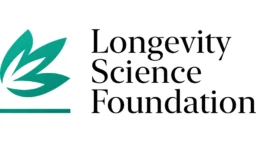 The Longevity Science Foundation Launches: The Longevity Science Foundation has launched today. This new Swiss foundation has confirmed that it will be committing over $1 billion in the next ten years to research, institutions, and projects advancing healthy human longevity.
The Longevity Science Foundation Launches: The Longevity Science Foundation has launched today. This new Swiss foundation has confirmed that it will be committing over $1 billion in the next ten years to research, institutions, and projects advancing healthy human longevity.
Transhuman Coin Debuts on International Markets: A novel cryptocurrency, Transhuman Coin, has recently announced its debut. When a transaction occurs, this coin is automatically distributed back into funding its own growth and the development of research into cures for various disabilities, including age-related disorders.
Coming Up in October
Metabesity 2021: From the 11th to the 14th of October, Metabesity 2021 will be conducted on a virtual platform. Bringing together speakers from multiple walks of life, including research, investment, government policy, and patient advocacy, this conference will focus on chronic diseases, a shift from treatment to prevention, addressing the root causes of disease, and improving healthspan.

